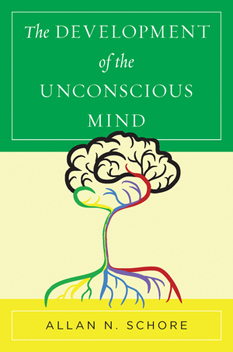Project Description
In this groundbreaking work Allan Schore delves deeply and widely into a number of essential brain/mind/body functions of the right-lateralized human unconscious mind that are essential to the human condition. In recent years the unconscious, once solely utilized in Freud’s psychoanalysis, has reappeared in a new revised form in the scientific and clinical literatures as essential “implicit” processes that are functional in the early stages of development and continue to operate beneath levels of awareness throughout the life span. These chapters offer developmental interpersonal neurobiological models of not only attachment but autistic spectrum disorders, early gender difference in male and female emotional and social development, and the central role of the right brain in the capacity for mutual love.
This book records the inspiring work of a psychoanalyst and therapist intrigued with Freud’s theory of the feelings that move the ‘unconscious’ mind. Allan Schore reviews 30 years of discoveries in psychology and neuroscience to support appreciation of the creativity of emotional engagements mediated between right hemispheres in intimate attachments through all stages of life.
Prepare the left side of your brain to be gobsmacked by Schore’s argument for the centrality of the right side of your brain in the development not only of the self, but in loving relationships as well, and the psychopathology of both. Schore is exceptional among most contemporary theorists in simultaneously speaking to the structural organization of the brain and how it functions over the course of early and lifelong development. Through it all Schore never loses sight of the actual messy moment-by-moment reparatory process of social interactions that sculpts individuals’ becoming who they are.
In The Development of the Unconscious Mind we join Allan Schore on his intellectual journey as he weaves a scholarly narrative integrating neuroscience into his theoretical model of attachment. At the foundational base of his scholarship is the insightful assumption that modern attachment theory is functionally a theory of self-regulation with a neurobiological substrate. By citing studies across several disciplines, he brilliantly builds a compelling argument for a neurobiological base for his theoretical conceptualizations and applies these conceptualizations to several relevant clinical and developmental questions related to vulnerability, trauma, sex differences, intimacy, and autism.
Over the last three decades, Dr. Allan Schore’s vast body of ‘disruptive’ research publications has significantly contributed to the current paradigm change in the world of mental health…I recommend to all mental health professionals the challenge to immerse themselves in these two books, a contribution and gift from a pioneer clinician-scientist…Dr. Schore’s work…has pushed beyond the limits, unconstrained by conventional expectations, to redefine basic assumptions in mental health and dared to engage with the ever-changing world of neuroscience informing psychotherapy, in both directions.


